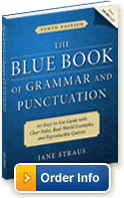|
Welcome to your GrammarBook.com E-Newsletter.
Big News for the New Year
Hello, everyone! We have an exciting announcement to make: A new edition of The Blue Book of Grammar and Punctuation will be available online and in bookstores beginning in February. In this new edition, we have stayed consistent with Jane Straus’s vision that you don’t have to be an English major to understand grammar and punctuation. You just need rules and guidelines that are easy to understand, with real-world examples.
Find out more in next week’s newsletter.
With our best wishes for good grammar,
The team at GrammarBook.com
|
“I find your GrammarBook.com website helpful because it gives me a lot of information in
the blink of an eye.”
—Chiranjeev P.
“The Blue Book of Grammar and Punctuation is wonderful as an added resource. Thank you for making it available.”
—Pat S.
“I truly love the information, rules, quizzes, and extras you have provided on your website.”
—John D.
|
|
|
I Don’t Use Use To but I Used To
The confusion over used to versus use to is largely due to the casual way we talk to each other. Unless the speaker makes a determined
effort to say “used [pause] to,” the d at the end of “used” gets swallowed by the stronger t sound. Usually, when
someone says something like “I used to read more,” anything from “use to” to “yoosta” is what we hear.
So is use to ever grammatical? Many authorities, including most of those found online, say use to is correct only in one special case:
when it is preceded by did, did not, or didn’t, as in, Did you use to live nearby? or He didn’t use to be a writer.
In all other cases—i.e., most of the time—used to is the only option.
You’d think that would settle it. However, one finds dissension among eminent twentieth-century English scholars. In The Careful Writer
(1983), Theodore M. Bernstein verifies did use to and didn’t use to, but adds that “employing use in this sense,
though common in conversation, lacks grace in writing.” Roy H. Copperud concurs: in A Dictionary of Usage and Style (1967), he writes that
with did and didn’t, “the form is use to, though such constructions are clumsy and best
avoided.” But Bryan A. Garner, in A Dictionary of Modern American Usage (1998), takes issue: “It shouldn’t be
written didn’t use to.” And John B. Bremner, in Words on Words (1980), states flatly, “Some otherwise respectable
authorities notwithstanding, the use of use to instead of used to is barbaric.”
The best advice is to rewrite. Instead of Did you use to live nearby? one might say Did you ever live nearby? Instead of He didn’t use to be a writer, how about He never used to be a writer. Such easy fixes are painless ways around a
prickly mini-controversy.
Because of the E-Newsletter's large readership, please submit your English usage questions through GrammarBook.com's “Grammar Blog.” |
|
Pop Quiz
Start the New Year right by fixing any of the following sentences that need it.
1. There are four times as many rocks than there were before.
2. A dollar or two are all it costs.
3. This phenomena is all too common.
4. He is one of those people who like opera.
5. It had already began when me and Juan arrived.
6. The decision is theirs’ to make.
Free BONUS Quiz For You!
[[firstname]], because you are a subscriber to the newsletter, you get access to one of the Subscription Members-Only Quizzes. Click here to take a Pronouns Quiz and get your scores and explanations instantly!

“So convenient...hundreds of quizzes in one click.”
[[firstname]], Subscribe to receive hundreds of English usage quizzes not found anywhere else!
- Take the quizzes online or download and copy them.
- Get scored instantly.
- Find explanations for every quiz answer.
- Reproduce the quizzes to your heart's content.
- EASY to use.
- No software to download.
- No setup time.
- A real person to help you if you have any questions!
“Fun to test my skills!” “The explanations really help...thanks!”
Your choice: Subscribe at the $29.95 or $99.95 level ($30 off - regularly $129.95).
“I download the quizzes for my students who don't have computer access.”
Subscribe today to receive hundreds of English usage quizzes not found anywhere else!
“Makes learning English FUN!”
 |
Don't need all the quizzes at once?
You can now purchase the same quizzes individually for ONLY 99¢ each. Purchase yours here. |

Get Yours Today!
Get Amazon’s #1 Bestseller in Four Categories!
#1 in Grammar
#1 in Reading
#1 in Lesson Planning
#1 in Vocabulary |
The Blue Book of Grammar
and Punctuation by Jane Straus
An indispensable tool for busy professionals, teachers, students, homeschool families, editors, writers, and proofreaders.
Now available in print AND as an e-Book! Over 2000 copies are purchased every month!
Order Your Copy Today!
- Hundreds of Grammar, Punctuation, Capitalization, and Usage Rules
- Real-World Examples
- Spelling / Vocabulary / Confusing Words
- Quizzes with Answers
|
View the entire contents online
Discounts available for schools, bookstores, and multiple copies. Order Today!
 Wordplay Wordplay
Dijon vu: the same mustard as before.
A hangover is the wrath of grapes.
Does the name Pavlov ring a bell?
Pop Quiz Answers
1. There are four times as many rocks as there were before.
2. A dollar or two is all it costs.
3. This phenomenon is all too common.
4. He is one of those people who like opera. CORRECT
5. It had already begun when Juan and I arrived.
6. The decision is theirs to make.
Learn all about who and whom, affect and effect, subjects and verbs, adjectives and adverbs, commas, semicolons, quotation marks, and much more by just sitting back and enjoying these easy-to-follow lessons. Tell your colleagues (and boss), children, teachers, and friends. Click here to watch. |




 Wordplay
Wordplay
